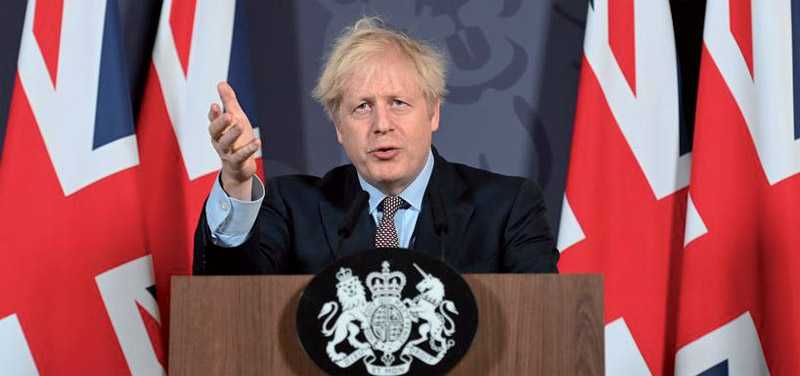Monday Feb 23, 2026
Monday Feb 23, 2026
Friday, 25 December 2020 01:14 - - {{hitsCtrl.values.hits}}

British Prime Minister Boris Johnson holds a news conference in Downing Street on the outcome of the Brexit negotiations, in London - Reuters
LONDON/BRUSSELS (Reuters): Britain clinched a narrow Brexit trade deal with the European Union on Thursday, just seven days before it exits one of the world’s biggest trading blocs in its most significant global shift since the loss of empire.
The deal means it has swerved away from a chaotic finale to a tortuous divorce that has shaken the 70-year project to forge European unity from the ruins of World War II.
European Commission President Ursula von der Leyen told reporters: “It was a long and winding road. But we have got a good deal to show for it. It is fair, it is a balanced deal, and it is the right and responsible thing to do for both sides.”
British Prime Minister Boris Johnson tweeted a picture of himself inside Downing Street, raising both arms in a thumbs-up gesture of triumph. “We have taken back control of our destiny,” he told reporters. “People said it was impossible, but we have taken back control.”
“We will be an independent coastal state,” he said. “We will be able to decide how and where to stimulate new jobs.”
Chief EU Negotiator Michel Barnier was able to say for the first time in four long years: “The clock is no longer ticking.”
While the last-minute deal prevents the most acrimonious ending to the saga on 1 January, the United Kingdom is set for a much more distant relationship with its biggest trade partner than almost anyone expected at the time of the 2016 referendum.
A deal had seemed imminent for almost a day until haggling over just how much fish EU boats should be able to catch in British waters delayed the announcement of one of the most important trade deals in recent European history.
The UK formally left the EU on 31 January but has since been in a transition period under which rules on trade, travel and business remained unchanged until the end of this year.
The details of the accord have yet to be made public, but if the sides have struck a zero-tariff and zero-quota deal, it will help to smooth trade in goods that makes up half their $900 billion in annual commerce.
Even with an accord, some disruption is certain from 1 January when Britain ends its often fraught 48-year relationship with a Franco-German-led project that sought to bind the ruined nations of post-World War II Europe together into a global power.
Confederation of British Industry Director-General Tony Danker gave the deal a grudging welcome:
“Coming so late in the day, it is vital that both sides take instant steps to keep trade moving and services flowing.”
After months of talks that were at times undermined by both COVID-19 and rhetoric from London and Paris, leaders across the EU’s 27 member states have cast an agreement as a way to avoid the nightmare of a “no-deal” exit.
But Europe’s second-largest economy will still be quitting both the EU’s single market of 450 million consumers, which late British Prime Minister Margaret Thatcher helped to create, and its customs union.
When the UK shocked the world in 2016 by voting to leave the EU, many in Europe hoped that it could stay closely aligned. But that was not to be. Von der Leyen said that “parting is such sweet sorrow”.
Johnson, the face of the pro-Brexit campaign, had asserted that, since 52% had voted to “take back control” from the EU, he was not interested in accepting the rules of either the single market or the customs union.
The EU did not want to give unfettered privileges to a freewheeling, deregulated British economy outside the bloc, and so potentially encourage others to leave.
The result was a tortuous negotiation over a “level playing field” in competition, which the EU demanded in return for access to its market.
The trade pact will not cover services, which make up 80% of the British economy, including a banking industry that positions London as the only financial capital to rival New York.
Access to the EU market for UK-based banks, insurers and asset managers will become patchy at best.
JPMorgan said the EU had secured a deal that allowed it retain nearly all of its advantages from trade with the UK but with the ability to use regulations to “cherry-pick” among sectors where the UK had advantages, such as services.
Brexit campaigner Nigel Farage said the deal would keep the UK far too closely aligned with the EU, adding that he hoped this would be the beginning of the end of the bloc.